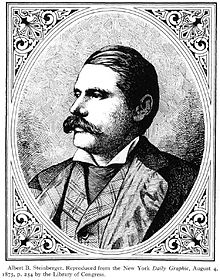Albert Barnes Steinberger
| Albert Barnes Steinberger | |
|---|---|

Portrait of Albert Barnes Steinberger
|
|
| 1st Prime Minister of Samoa | |
|
In office 22 May 1875 – 8 February 1876 |
|
| Succeeded by | Fiame Mata'afa Faumuina Mulinu'u II |
| Personal details | |
| Born | December 25, 1840 |
| Died | May 1, 1894 Massachusetts |
Colonel Albert Barnes Steinberger (December 25, 1840 – May 1, 1894, Massachusetts), was an American agent who became the first Prime Minister of Samoa in 1875, in a context of colonial rivalries around the archipelago.
His father was a doctor; he was the sixth of nine children, and grew up in Pennsylvania. At the age of 18, he moved to Colorado, where he briefly entered politics and wrote plays. In the early 1860s, he returned to the East Coast and lived in New York. He married in 1867, but his wife died four years later, after a long illness.
In the early 1870s, Americans had commercial interests in the Samoan archipelago, which consisted of distinct and sometimes rival indigenous monarchies. British and German commercial interests were also present. A Samoan national government existed, consisting of two joint kings, and a bicameral assembly representing the different districts of the country. Malietoa Laupepa and Tupua Pulepule, from lineages of the traditional aristocracy, were the two kings. In 1873, United States President Ulysses S. Grant sent Steinberger as an emissary to Samoa, to represent him to the chiefs, and to report on the situation on the islands. Steinberger presented himself as a "colonel", but there is no evidence that he actually held such a rank, although he worked for a time in the US Army's treasury. He spent three months in Samoa, then went to Hamburg to negotiate with the Germans for the establishment of a Samoan government sensitive to American and German commercial interests. Returning to Samoa in 1874 on a US Navy ship, he managed to convene a large gathering of 8,000 chiefs, where a formal exchange of gifts between Samoans and Americans took place. Steinberger suggested to leaders the idea of an American protectorate on the archipelago, saying that it would preserve Samoan autonomy against any foreign power. However, he did not obtain the agreement of the US government for this proposal.
Steinberger became influential and popular with the Samoan authorities. As early as 1873, the government drafted a new constitution designed to promote stability favorable to the interests of foreign investors. Instead of a joint monarchy, the greatest chiefs would now alternate on the throne, Malietoa Laupepa exercising alone until his death the functions of king. The parliament is reorganized, now including a chamber of ali'i or nobles (chosen by the various districts of the country, and formally appointed members by the king) and a chamber of elected representatives. Each district had a governor, responsible to the king. On July 4, 1875, he was appointed by the king to the new position of prime minister at the age of thirty-four years. Overall, Samoans are satisfied with these measures, and the government led by Steinberger; as the guarantor of their political independence.
...
Wikipedia
